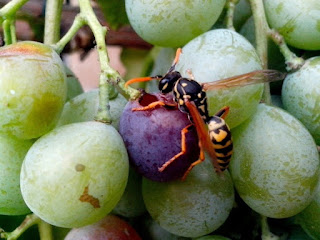Pondering the Evil of Wasps
A spell back, we used the expensive word anthropomorphize, which basically means to assign human traits to animals and other things. It is also a very common thing to do. Charles Darwin saw evil in the insect world and wondered how a loving God can allow this. Others have wondered about similar things.
Evil is actually rebellion against God and his Word, and critters are doing what they know without considering morality. In discussing biology, however, their predatory behavior is often called natural evil.
 |
| Wasp on grape, Pixnio / Bicanski |
Who hasn’t had a picnic ruined by angry, stinging wasps coming out of nowhere, or fled in terror when stumbling across a hornet’s nest in a treehouse or toolshed? Their vicious stings have earned them a nasty reputation, but the evil of wasps goes much deeper.In the world of insects, known for some pretty terrifying predators, wasps are premier killers. Their sleek sports-car exterior (often black and yellow) belies a complex arsenal of anatomical, physiological, and behavioral designs to deal out death and destruction.
You can read the rest (or listen to the audio by my favorite reader) by buzzing on over to "Why Are Wasps So Evil?"